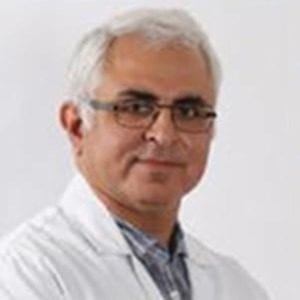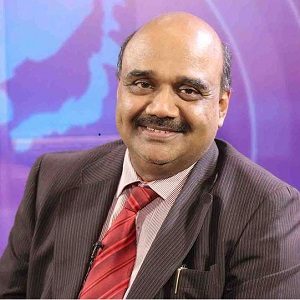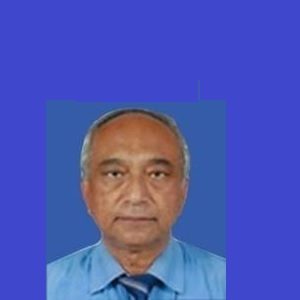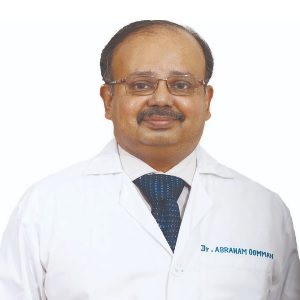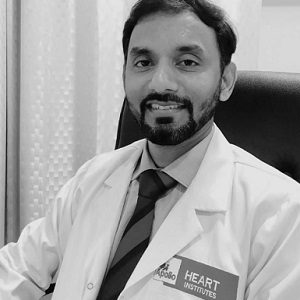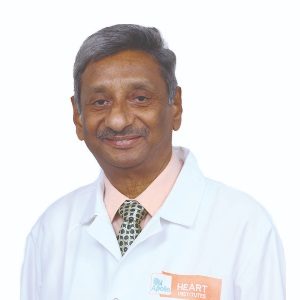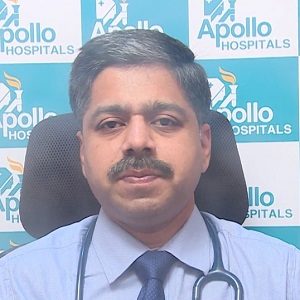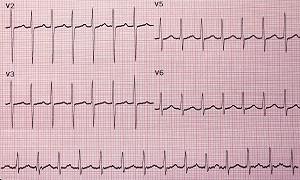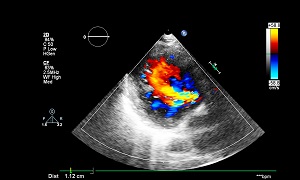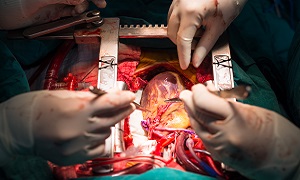Best Doctors in India for Pericardial Effusion Treatment
- Cardiologist, Gurugram, India
- Over 20 years’ experience
Profile Highlights:
- Dr. Hemant Madan is an experienced and accomplished cardiologist, with a professional experience of around 20 years.
- His expertise includes all aspects of cardiology, including pediatric cardiology, complex coronary interventions, device implantation, all kinds of rhythm disorders, percutaneous treatment of valve stenosis, and peripheral interventions.
- Dr. Madan pursued his Fellowship at the Royal College of Physicians from Edinburgh in UK.
- Cardiac Surgeon, Gurugram, India
- Over 15 years’ experience
Profile Highlights:
- Dr. Rachit Saxena is an experienced cardiac surgeon, who is known for his extreme dedication to his profession, and for providing absolute patient satisfaction.
- Supported by an efficient cardiac surgical team, Dr. Saxena is known for successfully managing the most complex of cardiac surgical problems.
- Dr. Rachit Saxena is known especially known for the capability to perform cardiac surgery with minimal blood requirement and ensure early mobilization and return to work.
- Cardiothoracic Surgeon, Chennai, India
- Over 25 years’ experience
Profile Highlights:
- Dr. T Sundar is one of the best cardiothoracic surgeons in India.
- He is having extensive exposure to critical heart diseases and he has operated on them successfully.
- Dr. T Sundar is a Senior Consultant at Apollo Hospitals since 2003.
- He has been associated with international standards of surgery and diagnosis since his education period.
- Cardiothoracic and Vascular Surgeon, New Delhi, India
- Over 36 years’ experience
Profile Highlights:
- Dr. N Sastri is a renowned cardiothoracic surgeon in India with extensive experience in critical heart surgeries.
- He has nearly 36 years of experience and is a senior consultant- Cardiothoracic & Vascular Surgery with Indraprastha Apollo Hospitals, New Delhi.
- Dr. Sastri specializes in the diagnosis and treatment of vascular disorders using advanced techniques. He has expertise in Total Anomalous Pulmonary Venous Connection Repair, Arterial and Ventricle Defects Surgery, Cardiac Resynchronization Therapy, Balloon Valvuloplasty, CABG LV restoration, PDA Device Closure, PPI, Valve Replacement, and Atrial Fibrillation Surgery.
- Over the years’ Dr. Sastri had treated patients across various countries. In addition to the adult and neonatal cardiac surgeries, he is involved in research and put out many research papers in different medical journals.
- Interventional Cardiologist, New Delhi, India
- Over 47 years experience
Profile Highlights:
- Dr. Prashanta Kumar Ghosh is a senior cardiologist at Indraprastha Apollo Hospital in New Delhi with experience of nearly 47 years in the field.
- Dr. Ghosh has expertise in testing and monitoring cardiac problems. The procedures mainly include minimally invasive cardiac surgery, implantations, device closure for congenital heart diseases, cardiac catheterization, Carotid Angioplasty, Stenting, etc. Half of his experience came from practicing non-invasive cardiology.
- He has so far performed nearly 3 lakh Echos as well as thousands of Doppler and Trans Esophageal Echos in his professional journey.
- Dr. Ghosh has participated in many studies and published papers in various conferences and journals. He also delivers lectures to the students of many institutions across India and abroad.
- Cardiologist, Chennai, India
- Over 31 years’ experience
Profile Highlights:
- Dr. Abraham Oomman is one of the best Cardiologists in Chennai, having an experience of 31 years in this field.
- Dr. Oomman offers consultation and also performs cardiac procedures. He specializes in Preventive Cardiology, Interventional Cardiology, Rheumatic Heart Disease, and Lipidology.
- Patients also visit him for ASD and VSD Surgery, Dextro-Transposition of the Great Arteries (DTGA), Minimally Invasive Cardiac Surgery, and Vascular Surgery.
- Cardiologist, Chennai, India
- Over 22 years’ experience
Profile Highlights:
- Dr. Refai is a world-renowned cardiologist who practices at Apollo Hospital in Greams Road, Chennai.
- Dr. Refai completed advanced training in the United Kingdom after finishing his medical degrees in India.
- He specializes in Angioplasty (Stent implantation), Implantable Cardioverter-Defibrillators (ICDS), Transradial Rotablation, Chronic Total Occlusion Angiography, Pacemaker, Cardiac Invasive Procedures, Bypass Surgery, and other cardiovascular procedures.
- He was involved in many TAVI-related studies at King’s College Hospital in London, and a heart failure pilot trial at The Essex.
- Interventional Cardiologist, Chennai, India
- Over 38 years’ experience
Profile Highlights:
- Dr. I Sathyamurthy is a veteran Cardiologist and has an experience of more than 38 years in Interventional Cardiology.
- Dr. Immaneni Sathyamurthy is a distinguished personality who bagged Padma Shri, the fourth-highest Indian civilian award. In addition to it, he was conferred many awards for his contribution to the medical sciences.
- He has over 250 publications to his credit, some of these are used as textbooks in medical courses.
- Interventional Cardiologist, Chennai, India
- Over 25 years’ experience
Profile Highlights:
- Dr. Karthigesan A M is a renowned Interventional Cardiologist with more than two decades of experience.
- He completed advanced training in cardiac arrhythmia in the USA to serve his patients in a better way.
- Dr. A M Karthigesan received several awards from prestigious associations for his contribution to the field.
- Dr. Karthigesan authored several research papers and articles in premier periodicals and presented papers at national conferences.
- Interventional Cardiologist, Chennai, India
- Over 32 years’ experience
Profile Highlights:
- Dr. Asha Mahilmaran is a seasoned Interventional Cardiologist in Chennai, with more than three decades of expertise in the sector.
- She excelled in academics and was awarded a gold medal in medicine and cardiology.
- Dr. Mahilmaran offers Ventricular Septal Defect Surgery, Cardioversion, Carotid Artery Disease, Chest Pain Treatment, Cardiac Ablation, and Dextro-Transposition of the Great Arteries (DTGA), etc.
- Over the years, she has performed over 15,000 preventive heart checkups.
Best Hospitals in India for Pericardial Effusion Treatment
Pericardial Effusion
A pericardial effusion is a condition in which there is an excess of fluid between your heart and the sac surrounding the heart, which is termed the pericardium. Although most of them are not harmful, they can sometimes make the heart work poorly.
The pericardium is a tough and layered sac. When the heart beats, it slides easily within it. The sac’s two layers have around 2-3 tablespoons of clear and yellow pericardial fluid. When you suffer from pericardial effusion, an excess of fluid sits in the sac. Small ones may contain 100 milliliters of fluid, while large ones may have more than 2 liters.
Symptoms
In some cases, you might have significant pericardial effusion without having any signs or symptoms. This may be the case if the fluid has increased slowly.
When symptoms of pericardial effusion occur, they might include one or more of the following:
- Shortness of breath or difficulty while breathing
- Chest pain, which occurs usually behind the breastbone or on the left side of the chest
- Discomfort in breathing while lying down
- Swelling in the abdomen or the legs
- Chest fullness
If you feel chest pain that lasts over a few minutes, then it might be best to call a doctor or emergency services.
Causes
Pericardial effusion may be caused due to inflammation of the pericardium in response to an ailment or injury. It might also occur when the flow of pericardial fluid is blocked or when blood collects within the pericardium, such as from chest trauma. Some other causes of this condition can include the following:
- Autoimmune disorders like lupus or rheumatoid arthritis
- Inflammation of the pericardium after a heart attack or a heart surgery
- Spread of cancer particularly lung cancer, breast cancer, leukemia, melanoma, non-Hodgkin’s lymphoma, or Hodgkin’s disease
- Cancer of the pericardium or heart
- Chemotherapy treatments for cancer
- Radiation therapy treatment for cancer if the heart was within the radiation field
- Waste products in the blood caused by kidney failure
- Underactive thyroid
- Trauma or puncture wound near the heart after an open-heart surgery
- Viral, bacterial, parasitic, or fungal infections
- Certain prescription drugs
Diagnosis
Physical Examination
Echocardiogram
Electrocardiogram
In this method, electrodes placed on your chest help to trace the heart’s electrical activity. Certain patterns on the electrocardiogram can signal a pericardial effusion or the inflammation that causes it. If it is suspected, an echocardiogram may be used to confirm it.
Once the effusion has been identified, your doctor will need to figure out its size and severity. Usually, it’s small and doesn’t cause any serious problems. However, if it is large, it may even compress your heart and hamper its blood-pumping ability. Known as cardiac tamponade, this condition can be life-threatening.

